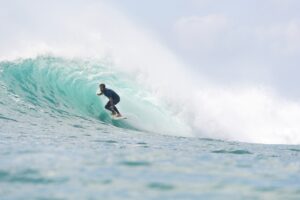Why is Surfing Hard? The Challenges and Rewards of Riding Waves
Explore the various factors that make surfing a challenging sport and learn how to overcome these obstacles to become a skilled surfer.
Surfing, a popular water sport, appears to be a thrilling and effortless activity for those who excel at it. However, beneath the surface lies a multitude of challenges that make surfing a difficult sport to master. This article will delve into the reasons why surfing is hard, focusing on the physical, technical, and mental aspects of the sport. In addition, we will answer common questions about surfing and offer advice to help you improve your skills.
Physical Demands of Surfing
Surfing demands a high level of physical fitness, including strength, endurance, balance, and flexibility. Paddling requires strong upper body and core muscles, while standing up on the board and maintaining balance calls for leg strength and agility. The repeated motion of paddling and standing up can lead to muscle fatigue, making it increasingly difficult to catch and ride waves successfully.
Technical Skills Required
Mastering the proper techniques is crucial in becoming a proficient surfer. This includes paddling efficiently, popping up, positioning yourself on the board, and carving turns. Additionally, reading and understanding wave patterns, knowing when to paddle out, and choosing the right wave to catch are all vital skills that require time and practice to develop.
Mental Challenges
Surfing presents numerous mental challenges, such as overcoming fear, maintaining focus, and developing patience. Overcoming the fear of wipeouts, large waves, or potential injury is essential for progression. Mental focus is necessary for reading waves and executing techniques, while patience is required as progress can be slow and incremental.
Environmental Factors
Surfing conditions, including wave size, wind, and tides, can significantly impact the difficulty of the sport. Inconsistent and unpredictable conditions make it harder to learn and practice specific skills. Furthermore, navigating crowded lineups and respecting surf etiquette add another layer of complexity to the sport.
Equipment and Gear
Choosing the right surfboard and gear plays a crucial role in your surfing experience. A board that is too small, large, or unsuitable for your skill level can make learning more challenging. Wetsuits, leashes, and other gear should be appropriate for the conditions you will encounter in order to maintain safety and comfort.
Learning Curve
Surfing has a steep learning curve, with many beginners struggling to catch their first wave. Progress can be slow and frustrating, often requiring hours of practice and dedication. Seeking guidance from experienced surfers or enrolling in surf lessons can help accelerate the learning process and build a solid foundation of skills.
Questions and Answers about Surfing Challenges
How long does it take to become good at surfing?
There is no definitive timeline for becoming a skilled surfer, as individual progress depends on factors such as physical fitness, prior experience,commitment, and frequency of practice. Generally, it may take several months to a few years of consistent practice to become proficient at surfing.
What is the best age to start surfing?
There is no specific age requirement to start surfing. However, children as young as 5 or 6 years old can begin learning with the proper guidance and supervision. It’s essential to ensure that the child is comfortable in the water and has basic swimming skills. Adults can also learn to surf at any age, although it may require more patience and persistence.
Can I learn to surf without taking lessons?
It is possible to learn surfing without formal lessons, but it can be more challenging and time-consuming. Lessons from experienced surf instructors provide structured guidance and help build a strong foundation of skills, making the learning process more efficient. Additionally, lessons ensure that you learn proper techniques, which can prevent the development of bad habits and reduce the risk of injury.
How can I overcome my fear of wiping out or large waves?
Overcoming fear in surfing is a gradual process. Begin by surfing in smaller, manageable waves to build confidence and gain experience. As you become more comfortable, gradually expose yourself to larger waves and challenging conditions. It can also be helpful to surf with more experienced friends or instructors who can provide guidance and support during your progression. Remember that wiping out is a natural part of surfing, and learning to fall safely can help alleviate some of the fear.
Conclusion
Surfing is a challenging sport due to its physical demands, technical skills, mental challenges, environmental factors, equipment requirements, and steep learning curve. While mastering surfing may be difficult, the rewards of catching and riding waves make the effort worthwhile. With dedication, patience, and proper guidance, you can overcome these challenges and become a skilled surfer, enjoying the exhilarating experience that the sport has to offer.





